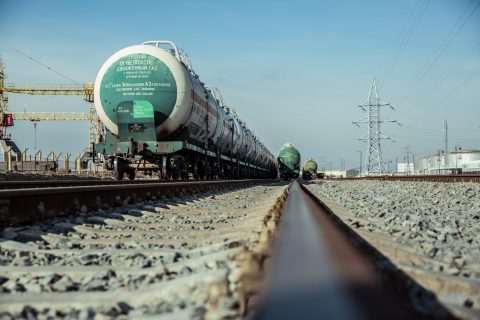Chinese support measures now also for companies abroad

Non-Chinese companies will be able to enjoy the various support policies of China in rail freight operations between Europe and China. This is one of several new measures of the Chinese government in supporting Eurasian rail freight traffic. On 3 April, the Ministry of Commerce issued a notice including eleven measures, with the main aim of increasing the role of China-Europe trains in dealing with the current corona crisis.
The notice in full is titled ‘Notice of Further Playing the Role of China-Europe Trains in Responding to the New Coronary Pneumonia Outbreak and Doing a Good Job in Stabilizing Foreign Trade, Stabilizing Foreign Investment, and Promoting Consumption’. In February, the government already introduced ten measures responding to the outbreak of the virus. The eleven new measures are more comprehensive and concrete.
Full support
The possibility for “foreign-funded companies” to make full use of the various support policies and measures of the China-Europe train is remarkable. Previously, support in the form of subsidies, for example, would be leveraged to local platforms. This would eventually resonate in the final price of the product, but did not directly apply to companies abroad.
“Domestic and foreign-funded enterprises should be treated equally and without discrimination”, the notice reads. It suggests to “support multinational companies to use the China-Europe train network to reduce the impact of the epidemic on their supply chain and industrial chain, and stabilise the confidence of foreign-funded enterprises”.
Cold chain support
Another noteworthy measure is the support for the cold chain; the conditioned transport of goods on rail. This is particularly applicable to the import meat, vegetables, fruits and dairy products, all much needed in Europe during the corona crisis.
The notice suggests support of local terminals that already have refrigerated warehouses, refrigerated carriage maintenance facilities, etc. to connect with the existing cold chain logistics chain. In addition, enterprises importing these products can count on additional support from the Chinese government. “The provinces and cities (in China) with greater influence will deliver to meet the consumption needs of residents everywhere.”
Support for Wuhan
The notice also mentions “the use the China-Europe train to serve Wuhan in resuming production”.
Rail transport that is less affected by the coronavirus should be leveraged to cultivate Wuhan’s development potential as a node city, and give priority to the transportation of automobile industry parts, mechanical equipment, optoelectronic products, chemical raw materials and other key industry materials.
Furthermore, China wants to have well-functioning early warning consultations on restrictive measures of countries along the corridor. This should define obstacles and difficulties encountered, maintain close communication with relevant national authorities, urge all countries to respect the authority and professional advice of the World Health Organization and prevent unnecessary trade restrictions.
Other measures
Other measures include a strengthening in the prevention of another outbreak in China, an improved level of international operation, better consolidation and setup of free-trade zones, efficient customs procedures, supporting the development of new foreign trade formats, full play to the role of China-Europe train in export and using the China-Europe train to help enterprises resume production.
The ten measures announced earlier were more more specifically aimed at improving customs procedures. An important step was allowing companies to do their customs clearance at the port of entry of exit. This was common practice before, but temporarily not possible last year due to the merger of customs authorities CIQ and China customs.
You just read one of our premium articles free of charge
Want full access? Take advantage of our exclusive offer






